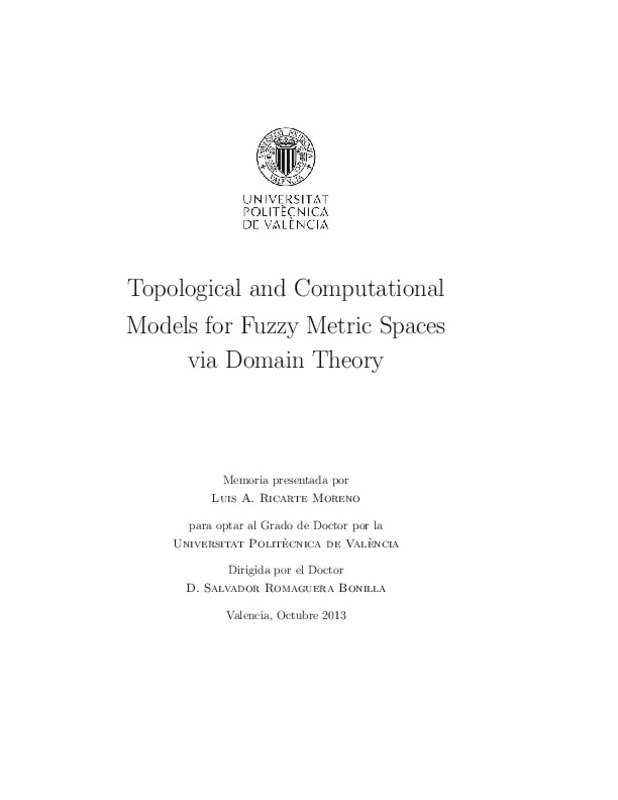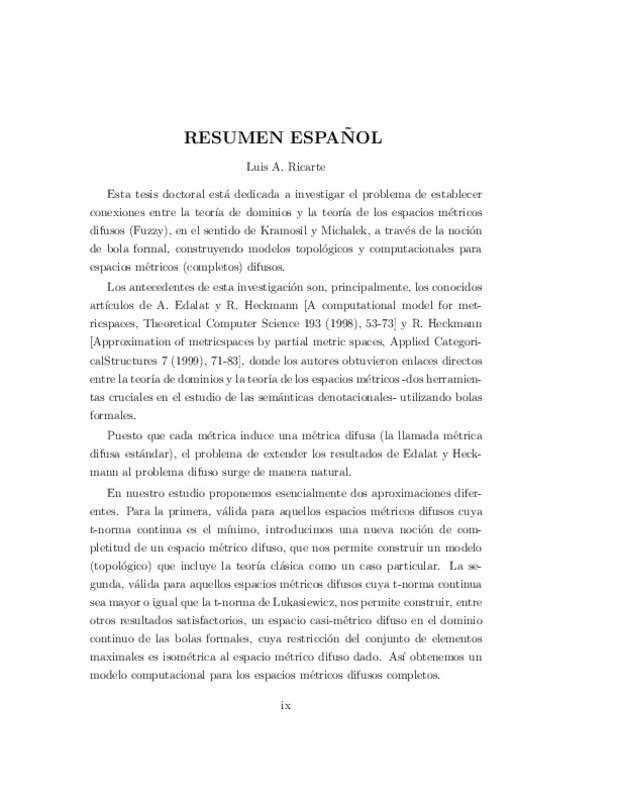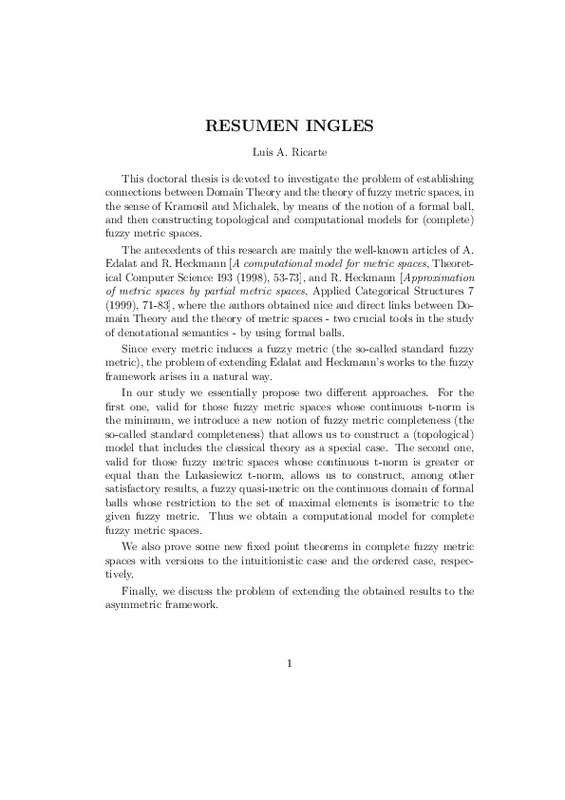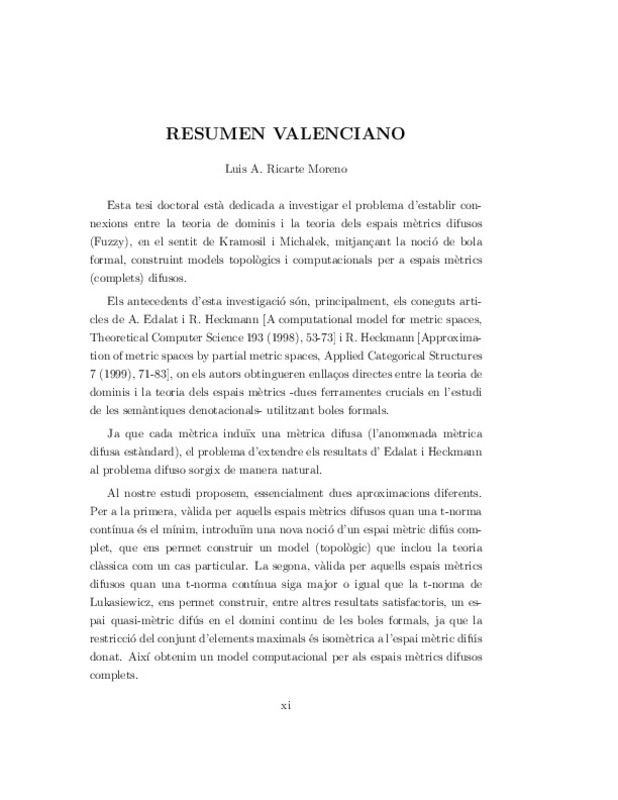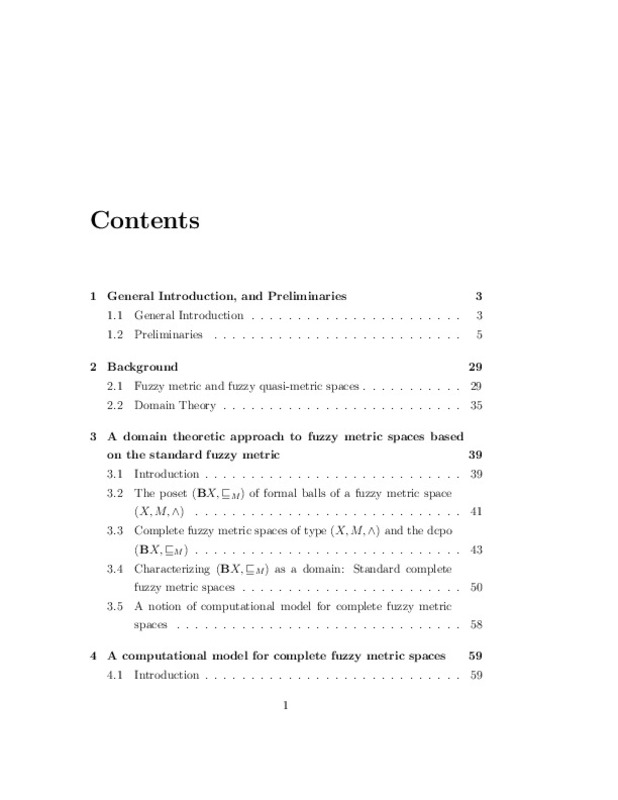- RiuNet repositorio UPV
- :
- Investigación
- :
- Tesis doctorales
- :
- Ver ítem
JavaScript is disabled for your browser. Some features of this site may not work without it.
Buscar en RiuNet
Listar
Mi cuenta
Estadísticas
Ayuda RiuNet
Admin. UPV
Topological and Computational Models for Fuzzy Metric Spaces via Domain Theory
Mostrar el registro sencillo del ítem
Ficheros en el ítem
| dc.contributor.advisor | Romaguera Bonilla, Salvador
|
es_ES |
| dc.contributor.author | RICARTE MORENO, LUIS-ALBERTO
|
es_ES |
| dc.date.accessioned | 2013-12-23T12:11:51Z | |
| dc.date.available | 2013-12-23T12:11:51Z | |
| dc.date.created | 2013-12-04T11:00:02Z | es_ES |
| dc.date.issued | 2013-12-23T12:11:49Z | es_ES |
| dc.identifier.uri | http://hdl.handle.net/10251/34670 | |
| dc.description.abstract | This doctoral thesis is devoted to investigate the problem of establishing connections between Domain Theory and the theory of fuzzy metric spaces, in the sense of Kramosil and Michalek, by means of the notion of a formal ball, and then constructing topological and computational models for (complete) fuzzy metric spaces. The antecedents of this research are mainly the well-known articles of A. Edalat and R. Heckmann [A computational model for metric spaces, Theoret- ical Computer Science 193 (1998), 53-73], and R. Heckmann [Approximation of metric spaces by partial metric spaces, Applied Categorical Structures 7 (1999), 71-83], where the authors obtained nice and direct links between Do- main Theory and the theory of metric spaces - two crucial tools in the study of denotational semantics - by using formal balls. Since every metric induces a fuzzy metric (the so-called standard fuzzy metric), the problem of extending Edalat and Heckmann's works to the fuzzy framework arises in a natural way. In our study we essentially propose two di erent approaches. For the rst one, valid for those fuzzy metric spaces whose continuous t-norm is the minimum, we introduce a new notion of fuzzy metric completeness (the so-called standard completeness) that allows us to construct a (topological) model that includes the classical theory as a special case. The second one, valid for those fuzzy metric spaces whose continuous t-norm is greater or equal than the Lukasiewicz t-norm, allows us to construct, among other satisfactory results, a fuzzy quasi-metric on the continuous domain of formal balls whose restriction to the set of maximal elements is isometric to the given fuzzy metric. Thus we obtain a computational model for complete fuzzy metric spaces. We also prove some new xed point theorems in complete fuzzy metric spaces with versions to the intuitionistic case and the ordered case, respec- tively. Finally, we discuss the problem of extending the obtained results to the asymmetric framework. | en_EN |
| dc.language | Inglés | es_ES |
| dc.publisher | Universitat Politècnica de València | es_ES |
| dc.rights | Reserva de todos los derechos | es_ES |
| dc.source | Riunet | es_ES |
| dc.subject | Fuzzy Metric Space | es_ES |
| dc.subject | Domain Theory | es_ES |
| dc.subject | Computational Model | es_ES |
| dc.subject | Fixed Point | es_ES |
| dc.subject | Fuzzy Quasi-Metric Space | es_ES |
| dc.subject.classification | MATEMATICA APLICADA | es_ES |
| dc.title | Topological and Computational Models for Fuzzy Metric Spaces via Domain Theory | |
| dc.type | Tesis doctoral | es_ES |
| dc.identifier.doi | 10.4995/Thesis/10251/34670 | es_ES |
| dc.rights.accessRights | Abierto | es_ES |
| dc.contributor.affiliation | Universitat Politècnica de València. Departamento de Matemática Aplicada - Departament de Matemàtica Aplicada | es_ES |
| dc.description.bibliographicCitation | Ricarte Moreno, L. (2013). Topological and Computational Models for Fuzzy Metric Spaces via Domain Theory [Tesis doctoral]. Universitat Politècnica de València. https://doi.org/10.4995/Thesis/10251/34670 | es_ES |
| dc.description.accrualMethod | TESIS | es_ES |
| dc.type.version | info:eu-repo/semantics/acceptedVersion | es_ES |
| dc.relation.tesis | 8193 | es_ES |
Este ítem aparece en la(s) siguiente(s) colección(ones)
-
Tesis doctorales [5389]






